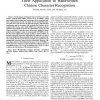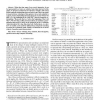227 search results - page 14 / 46 » Representing Incomplete Knowledge about Fuzzy Sets |
IJCNN
2000
IEEE
13 years 12 months ago
2000
IEEE
In this paper neuro-fuzzy synergism is applied to implement content sequencing in adaptive hypermedia systems. The level of understanding of the learner is used to construct lesson...
TFS
2008
2008
Type-2 Fuzzy Markov Random Fields and Their Application to Handwritten Chinese Character Recognition
13 years 7 months ago
In this paper, we integrate type-2 (T2) fuzzy sets with Markov random fields (MRFs) referred to as T2 FMRFs, which may handle both fuzziness and randomness in the structural patter...
LOCA
2007
Springer
14 years 1 months ago
2007
Springer
Many context- and location-aware applications request high accuracy and availability of positioning systems. In reality however, knowledge about the current position may be incompl...
IJCNN
2000
IEEE
13 years 12 months ago
2000
IEEE
Fuzzy c-varieties (FCV) is one of the clustering algorithms in which the prototypes are multi-dimensional linear varieties. The linear varieties are represented by some local prin...
TFS
2008
13 years 7 months ago
2008
When the time span of an event is imprecise, it can be represented by a fuzzy set, called a fuzzy time interval. In this paper, we propose a framework to represent, compute, and re...


